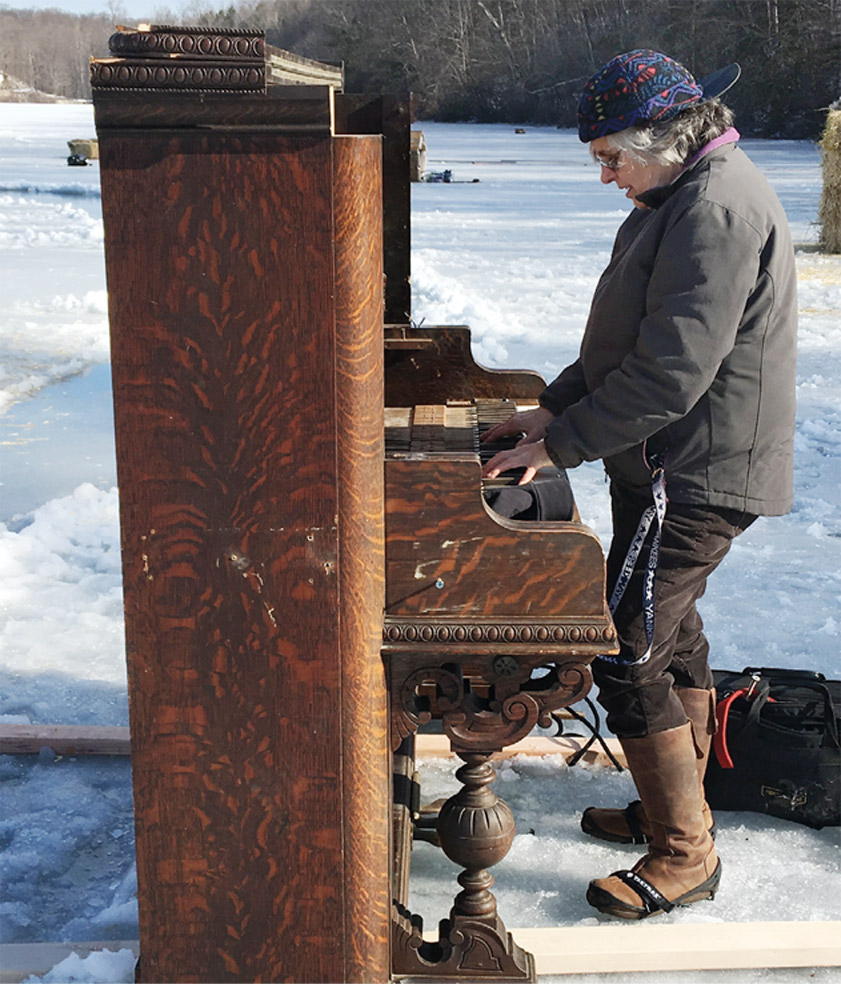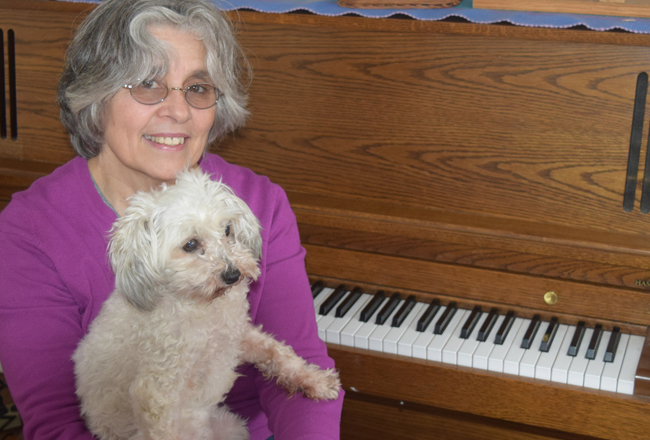When it comes to tuning and repairing pianos, Kim Papa has brought her toolkit and nearly a quarter-century of professional experience to settings ranging from modest school auditoriums to an extravagant $25,000-a-night presidential suite at Manhattan”™s Plaza Hotel. But nothing beat an unlikely piano location at a residence along a private lake in Litchfield County, Connecticut.
“I got a call asking if I could tune a piano for a party being held outdoors,” she recalled. “I was told the piano was in a carport, and this was outside in winter. When I get there, the homeowner was all smiles and I asked where the piano was. He said, ”˜Over there”™ ”” way out on the frozen lake where they made an ice rink with a disco ball. And I said, ”˜You”™ve got to be kidding. How did it get there?”™ And he said, ”˜We just slid it”™ ”” and he handed me a pair of ice cleats and said, ”˜Let”™s go.”™ And I went out there ”” it was a gorgeous day.”

The upright piano located on the frozen lake had loose tuning pins and Papa was concerned about tuning it properly due to the unlikely location. “It was a very difficult job,” she added. “I couldn”™t play because my fingers were cold. I did the best I could ”” they were so appreciative.”
Papa”™s Piano Tuning & Repair is based out of her New Fairfield home and serves Westchester, Putnam, Dutchess and Fairfield counties with occasional forays into New York City. A lifelong musician and music teacher, she turned her sights on piano tuning during the mid-1990s when she realized many of her students had instruments that were in need of adjustments.
“As a musician I thought, ”˜I wonder if I can do it,”™ ” she said. “I went to a school ”” actually, it was a correspondence school ”” and used my piano as a guinea pig, reluctantly. I went to a piano rebuilding shop in Peekskill and they hired me.”
In her 23rd year of business, Papa admitted her work is complex.
“It is not easy,” she stated. “I first thought that being a musician, this would be a piece of cake. I tune my guitar. I tune my bass. So what. Well, it has 256 strings and it has a lot of tension. Every piano is different and every climate is different and every piano reacts differently.
One aspect of her work that distinguishes Papa from her competition is her decision not to rely on digital tools for her work.


“I learned through my ear. I don”™t use a device,” she continued. “There are plenty of devices out there that do well, but I worked for an old-fashioned rebuilder who just said, ”˜I really want you to learn.”™ And I did, and I”™m glad that I did. The machine works well, but a customer I”™ve had for years said, ”˜The machine works, but the aural tuning is sweeter.”™ ”
Papa noted that piano tuning is further complicated by the distinctive differences between instruments. “My Baldwin is going to tune and sound differently than a Steinway,” she said. “Every piano is different. I once worked on a restored 19th century piano whose seasoned wood created just an exquisite sound.”
Papa recommended tuning a piano at least once a year, although she noticed that professional players prefer to have the instrument tuned three or four times annually. “The more that piano is tuned, the more it stays in tune,” she said.
One aspect that determines the sound quality of a piano is room temperature. “The weather is a big factor,” she continued. “If it is humid, the piano is going to get wet inside. If it is very dry, it is going to get very dry inside. It shouldn”™t be in extreme ”” you want to keep it at an even keel.”
Papa charges a basic fee of $120 and can usually complete her work within an hour, unless the instrument is in an advance state of poor health. Her work takes her from private homes to performance venues. She was even summoned on an emergency call for an A-list pop diva whose 88 keys needed help. She declined to identify that celebrity, noting that she was not in the business of bragging about prominent clients.
“My biggest fear is someone calls me and says they got this free piano on Craigslist,” she confided. “Or, they say that the person who sold me the house left me the piano, can you come tune it? If it”™s not tunable, it needs to be rebuilt (with) major repairs ”” and I never feel good about it.”
One question that drew a blank from Papa was a request to cite her favorite pianists. She paused for a moment and shook her head. “I don”™t listen to pianists that much, believe it or not,” she admitted.




















